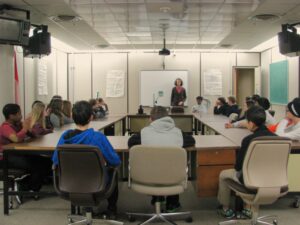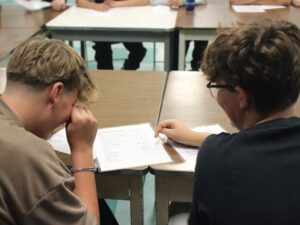
Continuity of Government
Educational program description
Using a real scenario that was done here when the bunker was an active military base, students will be brought back in time to September 1986. They will assume the role of key members of the War Cabinet and navigate making a difficult decision for Canada. Students will learn about how Canada’s government would have functioned during nuclear war and get to engage in their own debate.
Includes an informative tour component and an interactive activity with discussion.


Grade Level:
> Ontario - Grade 7–12
> Quebec - Secondary I–V
Format:
> On-Site
Duration:
> 2 hours
Cost:
> Starting at $13.00 per student
Language:
> English
> French (available by request)
Book your program
Review details on scheduling, pricing, and other logistics before you book.
Learning goals and curriculum connections
This program is great for social studies, history, geography, politics, and language classes.
Some skills students will learn in this program are communication, problem-solving, responsibility, collaboration, initiative, and making difficult decisions.
Grade 7–8 Language (English/French Immersion): Learn different skills for oral communication and critical thinking, as well as organizing ideas and presenting findings through engaging in a war cabinet debate.
- Strand: Oral Communication
Grade 7–8 Drama: Role play as the war cabinet in 1986, with students taking on the different roles of different ministers in the government and engage in a debate based on a real scenario used when this was a military base.
- Strand: Creating and Presenting
Grade 7 Geography: Learn about how human activities could affect our physical environment and complete a mini-inquiry while role-playing as the government making decisions.
- Strand A: Physical Patterns in a Changing World
Grade 7 Science and Technology: Learn about how technologies in the 20th century impacted the environment and experience how the government considers science and environmental impacts while making decisions.
- Strand B: Interactions in the Environment
Grade 8 Geography: Learn about the impacts that different conflicts like the Cold War had on settlement and on the physical environment while completing an inquiry on a specific settlement scenario from this period.
- Strand A: Global Settlement, Patterns, and Sustainability
Grade 8 Science and Technology: Learn about historical systems and structures and experience how the government considers science and environmental impacts while making decisions.
- Strand D: Systems in Action
Grade 9 Geography: Learn about how human activities like nuclear war could affect our environment and how governments respond to these risks.
- Strand B: Physical Geography and Physical Processes in Canada
Grade 10 History: Learn about Canada's response to the Cold War and Canada's relationship with the United States during it while exploring the cause and consequence of government decisions.
- Strand D: Canada, 1945–1982
- Strand E: Canada, 1982 to the Present
Grade 10 Civics: Learn about the structure of Canada's federal government and explore different ministries' perspectives while proposing different courses of action to an issue.
- Strand B: Civic Awareness
- Strand C: Civic Engagement, Service, and Action
Grade 11 American History: Immerse yourself in the Cold War period and examine the political relationships that America had with other countries through role-playing as the Canadian war cabinet during this period.
- Strand E: The United States since 1945
Grade 11 World History: Learn about the Cold War and the actions of different governments during the conflict while experiencing what it was like to make decisions during this period.
- Strand D: The Cold War Years, 1945–1991
Grade 11 Politics: Learn more about how the Canadian government and different prime ministers responded to the Cold War and get the chance to propose your own courses of action to a scenario from this time.
- Strand C: Policy, Politics, and Democratic Change
- Strand D: Personal Action on a Political Issue
Grade 11 Forces of Nature: Learn about a potential human disaster and consider geographic perspective while coming up with a plan to respond in the context of the Cold War.
- Strand B: The Physical Environment, Sustainability and Stewardship
Grade 12 Canada: History, Identity, and Culture: Learn about the culture in Canada during the Cold War and how Canada's policies and work with other countries impacted our nation's identity.
- Strand E: Canada since 1945
Grade 12 World History since 15th C: Learn about the Cold War and examine first-hand how this period caused disagreements and cooperation between different countries and groups.
- Strand E: The World since 1900
Grade 12 Politics: Learn about how the conflict of the Cold War has influenced politics, especially in Canada, and experience how political decisions impacted other countries in this period.
- Strand B: Political Foundations
- Strand C: Governments and Canadian and International Politics
Grade 9–12 English/French Immersion: Learn different skills for oral communication and critical thinking, as well as organizing ideas and presenting findings through engaging in a war cabinet debate.
- Strand: Oral Communication
Grade 9–12 Drama: Role play as the war cabinet in 1986, with students taking on the different roles of different ministers in the government and engage in a debate based on a real scenario used when this was a military base.
- Strand A: Creating and Presenting
History and Citizenship (I–II): Learn about the social phenomena from the Cold War period and experience the role that public institutions like the government played in these.
- Competency 1: Examines social phenomena from a historical perspective
- Competency 2: Interprets social phenomena using the historical method
- Competency 3: Constructs his/her consciousness of citizenship through the study of history
Geography (I–II): Explore a regional territorial issue during the Cold War and how countries could mutually benefit from each other in this period.
- Competency 1: Understands the organization of a territory
- Competency 2: Interprets a territorial issue
- Competency 3: Constructs his/her consciousness of global citizenship
History of Quebec and Canada (III–IV): Learn about Canada's response to the Cold War and interpret a specific scenario looking at a potential social phenomenon from the period.
- Competency 1: Characterizes a period in the history of Quebec and Canada
- Competency 2: Interprets a social phenomenon
- Specific Periods:
- 1945–1980 The modernization of Quebec and the Quiet Revolution
- From 1980 to our times: Societal choices in contemporary Quebec
Cultural Geography (V): Learn about the Cold War and its effects on Western regional areas and interpret a scenario examining the changes that could have occurred in this time.
- Competency 1: Deconstructs landscapes in the cultural area
- Competency 2: Interprets the dynamics of a cultural area
- Specific Concept: Western Cultural Area
History of the 20th C (V): Learn about how the world was divided from the Cold War and experience what it was like for governments to make decisions around continuity and change in this period.
- Competency 1: Characterizes a historical turning point
- Competency 2: Interprets a social phenomenon using the historical method
- Specific Timeline: A Divided World
Contemporary World (V): Pretending to be a war cabinet, examine a world issue from the time of the Cold War, establishing points of view and debating the topic as a class.
- Competency 1: Interprets a contemporary world problem
- Competency 2: Takes a position on a contemporary world issue
- Specific Concepts: Population, Power, Tensions, and Conflict
Language English or French (I–V): Taking what you learn about the Cold War, engage in a war cabinet debate, producing oral productions and collaborating with peers on ideas.
- English - Competency 1: Uses language/talk to communicate and to learn
- French - Compétence 3 : Communiquer oralement selon des modalités variées
Drama (I–V) : Create a dramatic presentation based on a real scenario used when this was a military where students role play as different ministers in the governments and engage in a debate.
- Competency 1: Creates dramatic works
- Competency 2: Performs dramatic works
Grade 7 | Grade 8 | Grade 9 | Grade 10 | Grade 11 | Grade 12
Social Studies | History | Geography | Language | English | French | Civics | Politics | Drama
The Diefenbunker is one of the most unique educational sites in Canada, offering an experiential learning environment, 75 feet underground. Students can immerse themselves in the Cold War and experience Canadian history from a perspective unlike any other. Explore our themed programs with links to elementary and secondary school curriculum.
SIGN UP FOR EDUCATOR RESOURCES
Receive occasional updates to your inbox on educational programs, lesson plans, and more!
By adding your details to this form, you are agreeing to receive email communications from the Diefenbunker Museum. You may opt out or unsubscribe at any time through the links at the bottom of our emails, or by emailing us at marketing@diefenbunker.ca.
